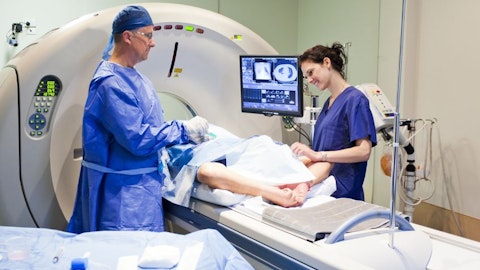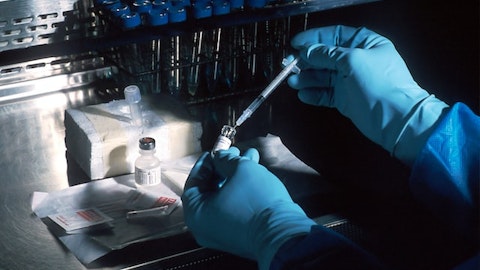Kevin Conroy: Ever since I’ve been with Exact Sciences, there’s been a litany of aspiring entrants into this field. There is just a long list of things you need to do to get into the field. And first of all, you need high quality products, high quality studies, high quality data published. You need to get through the gauntlet of FDA, Medicare, CMS, the United States Preventive Services Task Force, USPSTF, quality measure inclusion, commercial insurers. And we’ve yet to see any of these aspiring entrants get past first base there, namely high quality evidence and high quality study. So there’s a lot of work to be done for these folks before they will earn the ability to serve patients and physicians. And other than that, I’m not going to – we’re not going to comment on other people’s studies.
Operator: We’ll go next now to Puneet Souda at Leerink.
Puneet Souda : Yeah, hi Kevin. Thanks for taking the question and good luck to Megan. So Kevin, following up on the, sort of the competition side, just wondering how should we think about sort of the timing for Cologuard blood? Where’s the positioning of that? Any updated thoughts on the positioning of Cologuard blood as a product? And just wondering if you have any updated thoughts on blood-based assays that are potentially suggesting improvements in advanced adenoma. We haven’t seen the data yet, but remains to be seen. I appreciate it. Thank you.
Kevin Conroy: No update here. We’ve talked about this field for a long time. The data that we’ve seen to-date has been very impressive in terms of pre-cancer detection or in terms of specificity. So, hard to see how this class of tests makes it into the guidelines and into commercial viability reimbursed by commercial insurers. So there’s really no update there in terms of the, those who hope to get into the field. We have our own test. As we’ve articulated, there are many people who refuse a colonoscopy, refuse a Cologuard test, and still need to be screened and so we know who those people are. They are in our massive database and the only national database of colon cancer screening of its size and accuracy. So we’re able to reach out to patients who, for example, refuse frontline screening tests like colonoscopy or Cologuard and help get those people screened, and we think that there is a need to address there.
And we believe that our test is going to be able to meet that need in terms of when to expect to see that data again, that’s next year. Likely we will complete that study mid-year and then make the data available thereafter. So that’s where we are with blood-based colon cancer screening.
Operator: Thank you. We go next now to Dan Arias at Stifel.
Dan Arias : Good afternoon guys, thanks for the questions. I want to just ask a follow-up on re-screening. Everett, at the Analyst Day you talked about a pilot program that you guys have where you’re auto mailing kits directly to the patients as their recommended screening date arrives. Is that something that you think might get deployed more broadly? And if so, do you think that could start to move the needle on volumes, just given that it seems for re-screeners that they would be pretty receptive to that idea?
Everett Cunningham: Yes, thanks Dan. And just a clarification, it’s not an auto mail. Even though it might be a non-point of care visit, it’s still a prescription. And I go back to this – these are – from a re-screen population. These are different ways that we’re partnering with health systems, with payers, with physicians, in terms of getting hard to screen patients screened, whether it’s the re-screen population, the 45 to 49 or just the general population. We’re happy that we can do these different partnerships and we’ll continue to partner differently with health systems. Again, I go back to a lot of these different partnerships are being generated by the health systems themselves. And they know that we’re a good partner, because of what we have.
Our sales arm, our marketing arm, the way in which our customer call center can reach out to patients and remind them the importance of re-screening, our advanced order workflow we have there, so they like that. And then secondly, we’re a three-year interval versus FIT, which is a one-year interval, where they’ve been using these different reach out care gap programs. So now they are looking at us and they are finding that we’re a better partner. We’ll continue these throughout the rest of the year and years to come.
Operator: Thank you. We go next now to Dan Leonard at UBS.
Dan Leonard: Thank you. Kevin, I’d love to learn how or if you’re planning for additional FDA oversight of LDTs, specifically in your precision oncology business. And what do you think are the implications?
Kevin Conroy : We do have a lab developed test. Oncotype DX is a lab developed test. And because of the level of evidence that we have with Oncotype DX, that would not be a huge burden for us to make a submission. The quality standards that that test has undergone, we’ve already submitted for IVDR and CE marking for that test. So the quality system there is incredibly strong. The interesting thing about the proposed LDT regulation is that Exact Sciences was built as a PMA or IDD company because of Cologuard. That means that the people, the incredibly complex systems, data that is collected, processes that you follow from quality systems and manufacturing to good manufacturing processes, and all that goes into that, that’s who we are as a company.
So we are better suited than anybody really in our field of advanced diagnostics, to be able to comply with the proposed lab developed regulations. That puts us in a good position, because we do have those people and systems in place to succeed. So although we have our view on lab developed test regulation, and we believe that it would have been better, and we still hope that Congress steps in and passes the VALID Act, we are very well prepared to be able to comply with the proposed LDT regulations.
Operator: Thank you. We go next now to Mark Massaro at BTIG.
Mark Massaro: Hey guys, congrats on the progress. Just a two-parter. It looks like you invested about $54 million to acquire Resolution Biosciences. I would just be curious as you think about valuations being down in the space, whether or not you have an appetite to do something larger. And then on the second part, you guys have indicated plans to soon launch MRD and CRC and breast in 2024, obviously both solid tumors. Can you just give us a sense of how you view the opportunity in MRD and blood cancers? Thank you.




